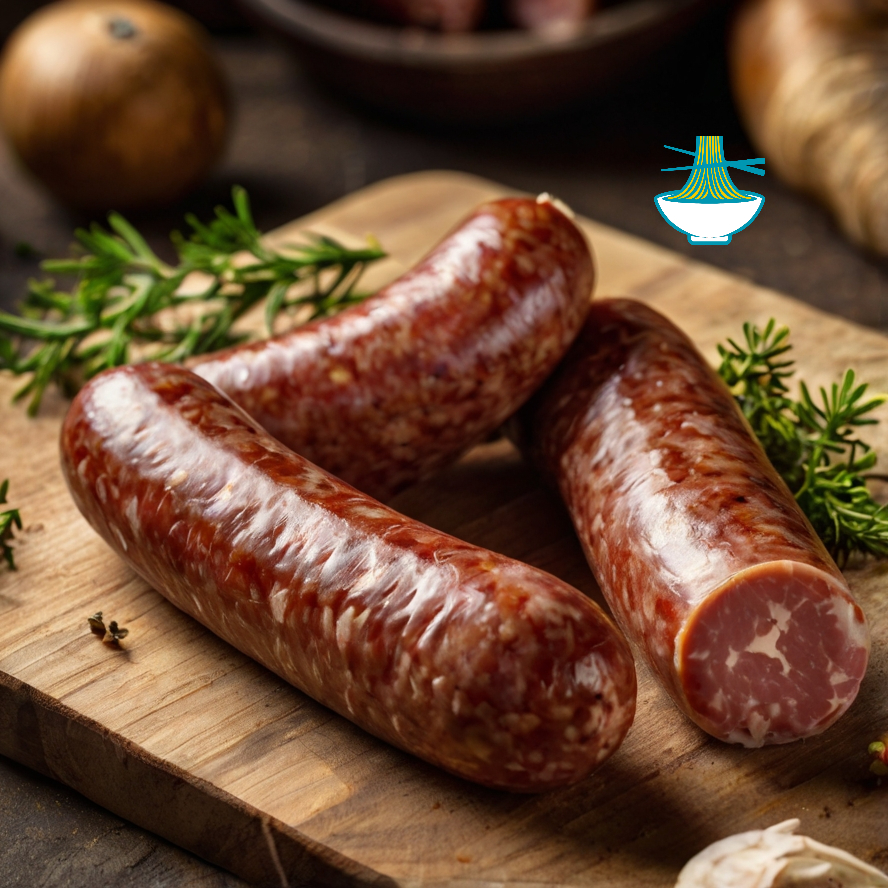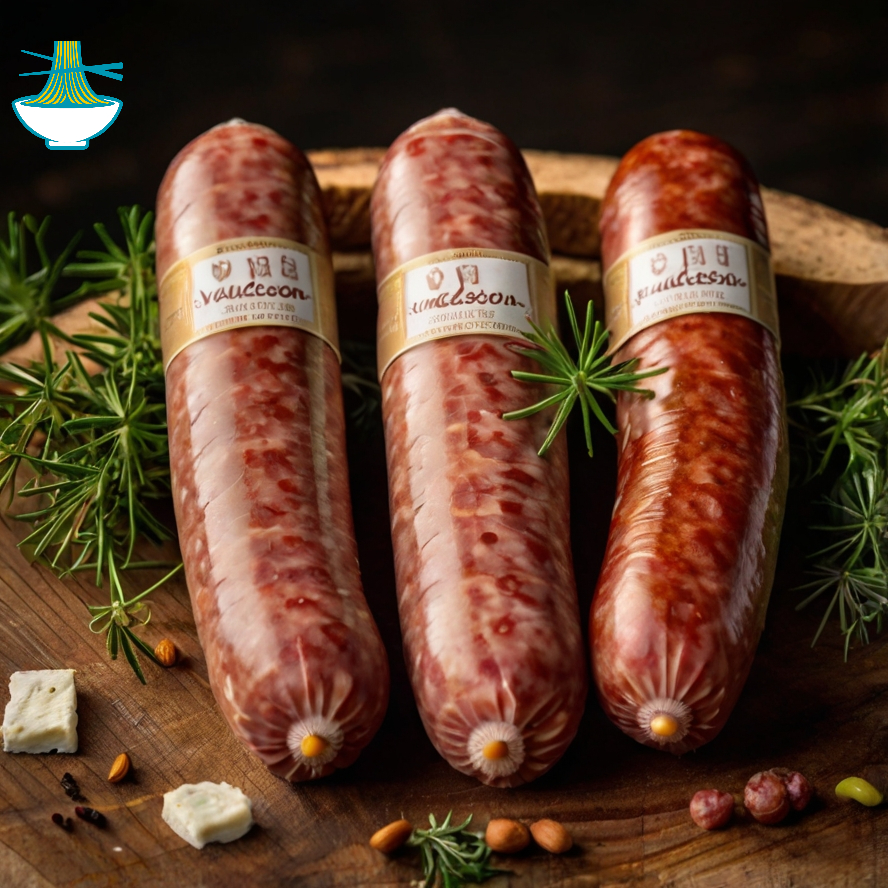Discover the rich flavors of Saucisson Vaudois, a traditional smoked pork sausage from Switzerland's Vaud region. This recipe guides you through crafting this flavorful delicacy at home, combining spices and smoking techniques for a genuine taste of Swiss cuisine. Perfect for charcuterie boards or a hearty meal.
Ingredients:
- 1 kg pork shoulder, cut into small pieces
- 200 g pork fat, cut into small pieces
- 15 g kosher salt
- 5 g black pepper
- 5 g garlic powder
- 5 g paprika
- 1 tsp dried thyme
- 1 tsp dried rosemary
- 100 ml dry white wine
- Sausage casings (pork or synthetic)
Instructions:
Prepare the Meat: Place the pork shoulder and pork fat in a large bowl. Mix with kosher salt, black pepper, garlic powder, paprika, thyme, and rosemary. Refrigerate for at least 24 hours to allow flavors to meld.
Grind the Meat: Pass the seasoned meat through a coarse grinder. For a finer texture, grind a second time.
Mix in the Wine: Gradually add the white wine to the ground meat mixture, stirring until fully incorporated. The mixture should be slightly sticky.
Prepare the Casings: Rinse the sausage casings under cold water, then soak them in water with a little vinegar for about 30 minutes. Rinse again and keep moist.
Stuff the Sausages: Slide the casings onto the sausage stuffer nozzle and tie a knot at the end. Stuff the casings with the meat mixture, being careful to avoid air bubbles. Twist the sausages at regular intervals to form links. Tie the open end of the casing.
Cure and Smoke: Hang the sausages in a cool, dry place for 24 hours to cure. Preheat your smoker to 65°C (150°F) and smoke the sausages for 3-4 hours, or until they reach an internal temperature of 70°C (160°F).
Finish and Store: Allow the sausages to cool to room temperature. Store in the refrigerator or freezer. Saucisson Vaudois can be enjoyed cold, or lightly cooked before serving.
Enjoy your homemade Saucisson Vaudois with crusty bread, cheese, and a glass of Swiss wine for an authentic experience!
Nutritional values
Pork Shoulder (1 kg, cut into small pieces)
- Calories: 250
- Protein: 20g
- Fat: 20g
- Carbohydrates: 0g
Benefits:
- High in protein, essential for muscle growth and repair.
- Provides important vitamins and minerals such as Vitamin B12, zinc, and iron.
- Adds flavor and richness to dishes.
Pork Fat (200g, cut into small pieces)
- Calories: 900
- Protein: 2g
- Fat: 98g
- Carbohydrates: 0g
Benefits:
- Adds moisture and flavor to the sausage mixture.
- Contains fat-soluble vitamins like Vitamin A, D, E, and K.
- Provides essential fatty acids for energy.
Kosher Salt (15g)
- Calories: 0
- Protein: 0g
- Fat: 0g
- Carbohydrates: 0g
Benefits:
- Essential for flavoring and preserving meats.
- Helps maintain fluid balance and proper nerve function.
- Use in moderation to avoid excessive sodium intake.
Black Pepper (5g)
- Calories: 255
- Protein: 10g
- Fat: 3g
- Carbohydrates: 64g
Benefits:
- Contains piperine, which may enhance nutrient absorption.
- Provides antioxidants and has potential anti-inflammatory properties.
- Adds flavor and warmth to dishes.
Garlic Powder (5g)
- Calories: 330
- Protein: 6g
- Fat: 0.5g
- Carbohydrates: 72g
Benefits:
- Contains allicin, which may have antimicrobial and anti-inflammatory effects.
- Adds robust flavor and potential health benefits.
Paprika (5g)
- Calories: 282
- Protein: 14g
- Fat: 12g
- Carbohydrates: 54g
Benefits:
- Rich in antioxidants, particularly Vitamin A.
- Adds color and a mild, sweet flavor to dishes.
Dried Thyme (1 tsp, ~1g)
- Calories: 276
- Protein: 9g
- Fat: 7g
- Carbohydrates: 63g
Benefits:
- Contains antioxidants and vitamins such as Vitamin C.
- May support respiratory health and digestion.
Dried Rosemary (1 tsp, 1g)
- Calories: 131
- Protein: 3g
- Fat: 5g
- Carbohydrates: 20g
Benefits:
- Contains antioxidants and compounds that may improve digestion.
- Adds a fragrant, pine-like flavor to dishes.
Dry White Wine (100ml)
- Calories: 83
- Protein: 0.1g
- Fat: 0g
- Carbohydrates: 2.7g
Benefits:
- Adds depth of flavor and acidity to the sausage mixture.
- Contains antioxidants such as polyphenols.
Sausage Casings (pork or synthetic)
- Pork Casings: Edible and used for structural purposes; nutritional values are minimal.
- Synthetic Casings: Not edible, used primarily for shape and structure.
Benefits:
- Natural casings contribute to the texture and flavor of sausages.
- Synthetic casings provide consistency in shape and size and are often used in commercial production.


Comments